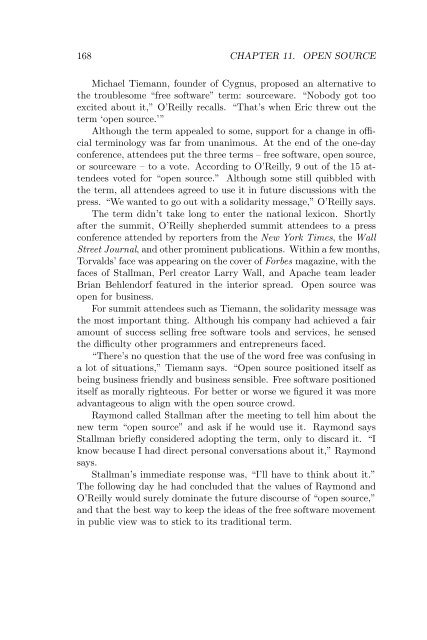You also want an ePaper? Increase the reach of your titles
YUMPU automatically turns print PDFs into web optimized ePapers that Google loves.
168 CHAPTER 11. OPEN SOURCE<br />
Michael Tiemann, founder of Cygnus, proposed an alternative to<br />
the troublesome “free software” term: sourceware. “Nobody got too<br />
excited about it,” O’Reilly recalls. “That’s when Eric threw out the<br />
term ‘open source.’”<br />
Although the term appealed to some, support for a change in official<br />
terminology was far from unanimous. At the end of the one-day<br />
conference, attendees put the three terms – free software, open source,<br />
or sourceware – to a vote. According to O’Reilly, 9 out of the 15 attendees<br />
voted for “open source.” Although some still quibbled with<br />
the term, all attendees agreed to use it in future discussions with the<br />
press. “We wanted to go out with a solidarity message,” O’Reilly says.<br />
The term didn’t take long to enter the national lexicon. Shortly<br />
after the summit, O’Reilly shepherded summit attendees to a press<br />
conference attended by reporters from the New York Times, the Wall<br />
Street Journal, and other prominent publications. Within a few months,<br />
Torvalds’ face was appearing on the cover of Forbes magazine, with the<br />
faces of Stallman, Perl creator Larry Wall, and Apache team leader<br />
Brian Behlendorf featured in the interior spread. Open source was<br />
open for business.<br />
For summit attendees such as Tiemann, the solidarity message was<br />
the most important thing. Although his company had achieved a fair<br />
amount of success selling free software tools and services, he sensed<br />
the difficulty other programmers and entrepreneurs faced.<br />
“There’s no question that the use of the word free was confusing in<br />
a lot of situations,” Tiemann says. “Open source positioned itself as<br />
being business friendly and business sensible. Free software positioned<br />
itself as morally righteous. For better or worse we figured it was more<br />
advantageous to align with the open source crowd.<br />
Raymond called Stallman after the meeting to tell him about the<br />
new term “open source” and ask if he would use it. Raymond says<br />
Stallman briefly considered adopting the term, only to discard it. “I<br />
know because I had direct personal conversations about it,” Raymond<br />
says.<br />
Stallman’s immediate response was, “I’ll have to think about it.”<br />
The following day he had concluded that the values of Raymond and<br />
O’Reilly would surely dominate the future discourse of “open source,”<br />
and that the best way to keep the ideas of the free software movement<br />
in public view was to stick to its traditional term.


